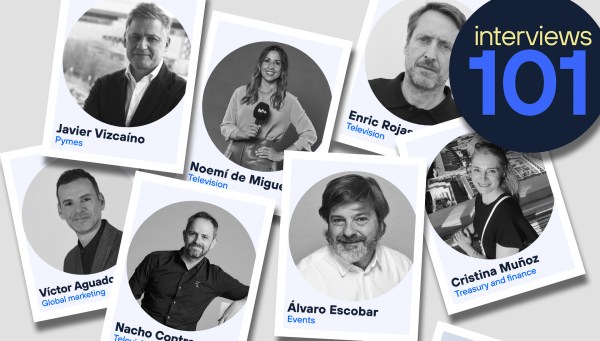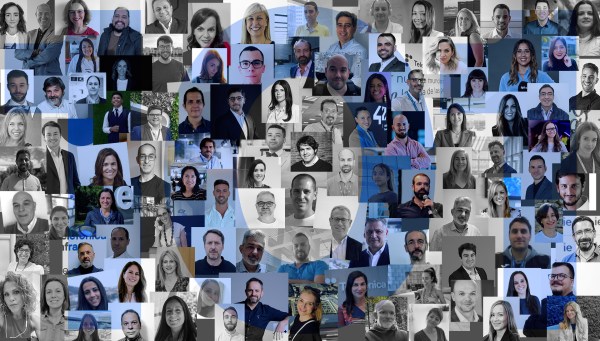Tell us a little about yourself. What does your job at Telefónica involve?
I’m Rose Agüero, Costa Rican by origin, Spanish by choice and curious by nature. Although I started young, I have been growing within Telefónica for more than 13 years, from my first steps in the opening of the market in Costa Rica, through projects in Central America, to today, where I am part of the global area of Digital Innovation.
Along the way I have had the opportunity to develop professionally in areas such as data analytics, product management and project management, until I reached my current role as Senior Program Manager.
I currently coordinate strategic programmes that connect global and multidisciplinary teams, aligning objectives and transforming the way we work. I lead people with the intention of generating genuine human connections, fostering team cohesion and promoting ways of working that balance productivity and well-being. All this in an international environment where we manage people through screens and different time zones.
I am passionate about efficiency, and also about creativity. I enjoy questioning the established, creating inspiring content and participating in spaces where technology not only solves, but also connects and transforms.
One of the recent achievements that has made the biggest impression on me was leading the Novo App Brasil programme in 2024 from my role as Program Manager, working hand in hand with a multidisciplinary team of leaders in different areas.
After more than a year of intense collaborative work, we managed to deliver more than 26 projects within the programme: a total redesign of the VIVO application in Brazil, with an optimised browsing experience and improved functionalities, which impacted more than 30 million people and was also recognised with several awards in the Brazilian market.
However, beyond the technical, visual and functional success of the application, it was a true example of global collaboration, teamwork and collective commitment.
How will the development of AI and other technologies impact the field of innovation?
The development of Artificial Intelligence (AI) and other emerging technologies is already profoundly transforming the innovation ecosystem. Some of the areas where the impact will be particularly relevant are:
- Acceleration of innovation.
- AI makes it possible to optimise development cycles, anticipate market demands and make more agile decisions, positioning organisations in highly competitive environments.
- Transformation of creative processes.
- Generative AI is redefining the way we design, think and solve problems, offering new perspectives for innovation.
- Efficiency and sustainability.
- Thanks to advanced data analysis, AI helps to reduce waste, improve the use of resources and move towards more sustainable models.
- Democratisation of innovation.
- AI is increasingly within the reach of SMEs, entrepreneurs and independent professionals, opening the doors to a more diverse and inclusive innovation ecosystem.
- Ethical and regulatory challenges.
- The accelerated growth of these technologies poses challenges that require solid regulatory frameworks to ensure responsible, transparent and fair use.
In short, AI is driving a new era of innovation, but its development must go hand in hand with an ethical, humane and sustainable vision.
What types of technological innovation are there?
At Telefónica we work with different approaches to innovation, which can be classified according to the level of transformation they involve. Here are some examples applied within our company:
- Incremental innovation
- Continuous improvements to existing products and processes.
- 🔹 Example: Periodic updates to the Telefónica Mi Movistar, VIVO application, adapting to new customer needs.
- Disruptive innovation
- Introduces more accessible or simpler solutions that transform existing models.
- 🔹 Example: Aura, Telefónica’s virtual assistant based on cognitive AI, which revolutionised interaction with users.
- Radical innovation
- Generates completely new technologies or models that redefine industries.
- 🔹 Example: Telefónica Tech’s commitment to the Metaverse and Web3, integrating AI, 5G and blockchain.
- Open innovation
- Promotes co-creation with start-ups, universities and external partners.
- 🔹 Examples:
- Wayra, our open innovation and corporate venture capital platform.
- Open Innovation Campus, which connects with the academic world.
- Applies technology to solve social and environmental challenges.
- 🔹 Example: Satellite connectivity projects in rural areas of Latin America and energy efficiency initiatives as part of our ESG strategy.
What are some notable examples of recent technological innovation?
The following trends are shaping the present and the future of innovation:
Agentic AI. Systems with the autonomous capacity to make complex decisions, beyond programmed responses.
- AI governance. Tools and frameworks that guarantee the ethical, transparent and responsible use of artificial intelligence.
- Quantum cybersecurity. Advanced solutions to protect information from future threats in post-quantum environments.
- Climate technology. Innovations aimed at environmental sustainability and the fight against climate change.
- Hybrid and spatial computing. Data processing that combines local, cloud and space capabilities.
- Multifunctional robotics. Adaptive robots capable of assuming various functions in changing contexts.
- Human-machine convergence. Integration of human skills with artificial capabilities to enhance decision-making, creativity and performance.
These technologies are not only transforming industries, but also redefining how we interact with the world around us.
What benefits does technological innovation present for companies and SMEs as well as for individuals?
Benefits for companies and SMEs
- Optimisation of costs and efficiency. Digitisation allows for cost reduction by automating routine tasks and improving operational efficiency.Access to new markets. Technology facilitates expansion into new markets, allowing SMEs to compete on equal terms with larger companies through e-commerce and globalisation
- Improved customer experience. Technology allows products and services to be personalised, improving customer satisfaction by better understanding their needs through digitally collected data.
- Flexibility and scalability. Companies can adapt quickly to changes in demand, expanding their capacity without large investments.
Benefits for individuals
- Communication and connection. Technology facilitates instant communication and social connection, regardless of borders.
- Access to information and education. Technology offers quick access to a wide range of information and online educational resources, promoting learning and personal development.
- Autonomy and flexible working. Remote working and online education provide greater autonomy and flexibility in time management, reducing the stress associated with strict schedules.
- Efficiency at work. Technological tools improve work productivity, allowing people to have more time for personal and family interests.
In international teams, what can be done to improve management, efficiency and communication?
- Define a clear and shared work process from the start (Way of Working – WoW). Insist, persist and never give up
- Use collaborative tools such as Teams, Confluence or Jira to coordinate, document and follow up.
- Establish time overlap zones to facilitate effective meetings and avoid blockages.
- Centralise information to ensure transparency and accessibility for the whole team.
- Foster team cohesion through feedback sessions, virtual meetings and dynamics that reinforce the common culture, beyond distances.
What challenges arise when monitoring and controlling projects that span different countries and time zones?
- Cultural and communication differences. Managing international teams requires empathy, adaptability and clear communication to align expectations and working styles. This involves developing intercultural skills and adapting the leadership style to each context.
- Managing remote and multicultural teams. Coordinating people in different time zones and cultures requires the use of efficient digital tools, as well as clear policies for communication, collaboration and task monitoring.
- Monitoring performance. Tools such as Jira allow you to maintain visibility of progress in real time, improve traceability and proactively detect risks.
- Regulatory compliance. It is essential to adapt to local regulations — such as the General Data Protection Regulation (GDPR) in Europe or specific regulations in other regions — to guarantee security, privacy and legal compliance in each jurisdiction.
Which person working at Telefónica do you nominate for this interview for their professional excellence?
I would recommend Inés Vidal, with a solid track record in Product, and Susana Mielgo, with extensive experience as a Program Manager.
Since I arrived in Spain, both have become role models for me, women with exceptional leadership, a great capacity for innovation and a constant commitment to excellence.







